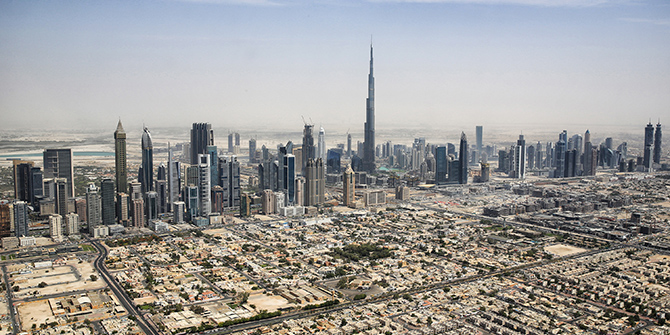On 12 January 2016, the LSE Middle East Centre and the UAE National Defense College co-hosted a workshop led by Dr Karen Young and Dr Robert Stewart-Ingersoll. The workshop examined labour dynamics in the Gulf Cooperation Council (GCC) states. The event took place under the Chatham House Rule and hosted nine speakers who analysed economic migration along with its challenges and opportunities. Participants were drawn from academic and government institutions from across the Gulf, Europe, and the United States.

Issues for discussion included the following:
- Migrants as human capital, institution builders and agents of social change
- Labour market reform in the GCC and why economic migrants make sense for Gulf states
- Demographic trends among migrants in the GCC
- The transforming ideational environment within the GCC
- State-building and the challenges of labour norm conformity in the Gulf
- Development of knowledge economies in the Gulf
- Comparative assessment of migration/integration
- The Transformation of Belonging
- Legal barriers to migration and integration to society in the Gulf
Recent developments across the six GCC states have shown the linkages between the flow of people and ideas in the Gulf with subsequent configurations of security, economic and political development policies. The participants discussed the links between the GCC states’ efforts at economic diversification with the demographic challenge of large guest worker populations.
The second session of the workshop focused on the movement and flow of people and ideas in terms of economic and security implications. The purpose of the workshop and the overall project is for the participants to collaborate and product multiple perspectives on the economic transition away from commodity-based economies, societal changes linked to large non-citizen populations and the implications for security policy inside the GCC states.
Migrants as Human Capital
The first major theme that emerged was on the opportunities and barriers GCC states have faced in their political drive toward transforming their economies into ‘knowledge based economies’. Due to a cultural aversion toward certain types of jobs and a desire to to develop quickly, GCC states have invited a high level of non-permanent migration in order to transform. Participants focused on different aspects of this theme. One participant analysed the structural issues to transform the GCC states from rentier economies to knowledge economies. Another participant discussed the actual incentives required for Gulf youth to pursue learning and innovation. The contradiction was raised: what does it mean to be a member of a society without citizenship rights, yet, at the same time, to contribute significantly to both social and economic life?
The second major theme that emerged during the workshop was how globalisation influences state development and labour patterns. Dramatic economic growth during the oil boom years depended upon imported labour, especially in the United Arab Emirates and Qatar. A discussion emerged on whether increased participation in the global economy will improve or undermine the treatment of labour. Gulf legal systems have developed through transfusion of norms and borrowing of national legal institutions. This hybridity of law does can be a source of tension. One researcher concluded that the more engaged Gulf states are in the global economy, the more likely they will adhere to the international norms on the protection of labour.
The third theme that emerged from the workshop dealt with the challenges Gulf states face in the process of state building. An interest in Gulf nationalism and the limitations of cultural preservation in diverse societies, especially those with minority national populations among expatriate residents. For example, cultural dilution is often cited as a top concern from Gulf nationals. Ideational flows emerge from diverse populations, and can become security concerns for governments.
Workshop participants looked at migration and its connection to state-building through multiple lenses. The economic perspective was largely in favor of migration due to its importance for growth within the GCC. However, counter-arguments were discussed with a focus on legal concerns over migrant rights and the issue of the right to residency attached to the ability to work. Issues of national identity and citizenship were also raised for further study. Throughout the workshop, participants urged the consideration of migrants/expatriates as critical assets to be embraced by GCC states. Below are some memos presented at the workshop.
Memos presented at the workshop:
- Cutting out the Middle Man: GCC Economic Strategies for Tackling Migration Racketeering
by Omar Al-Ubaydli
- Neoliberal Citizenship: The Transformation of Belonging
by Kevin W. Gray
- Globalisation and Human Trafficking: The GCC and the Rest
by Samuel R. Greene and Nathan W. Toronto



